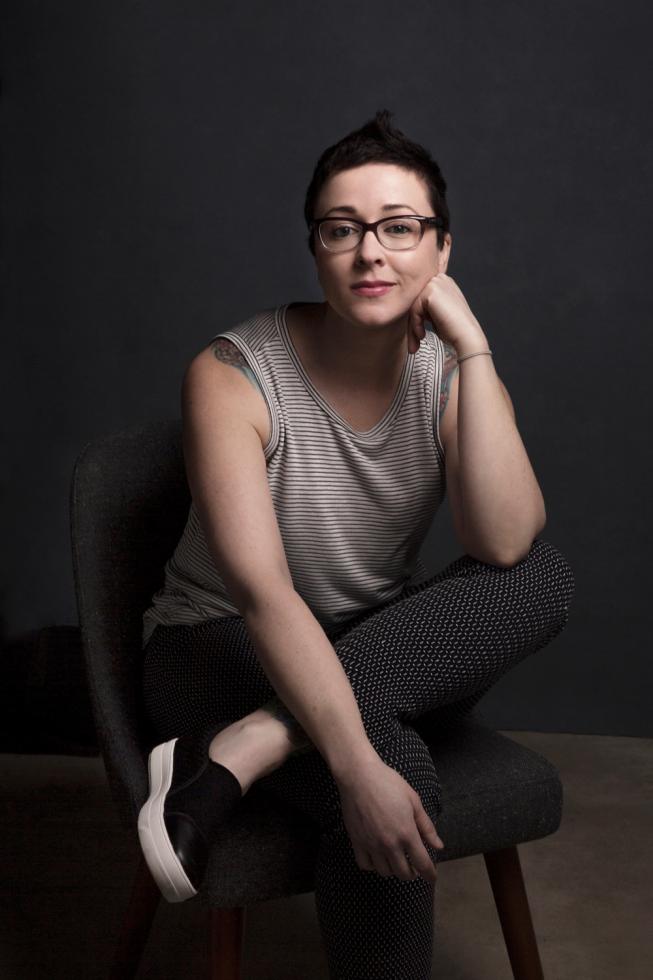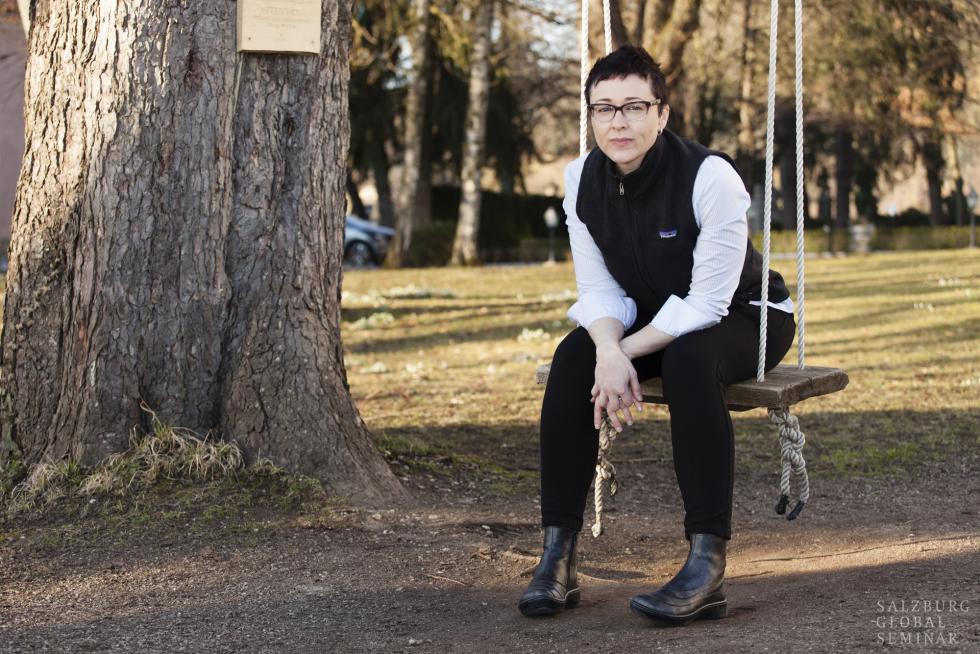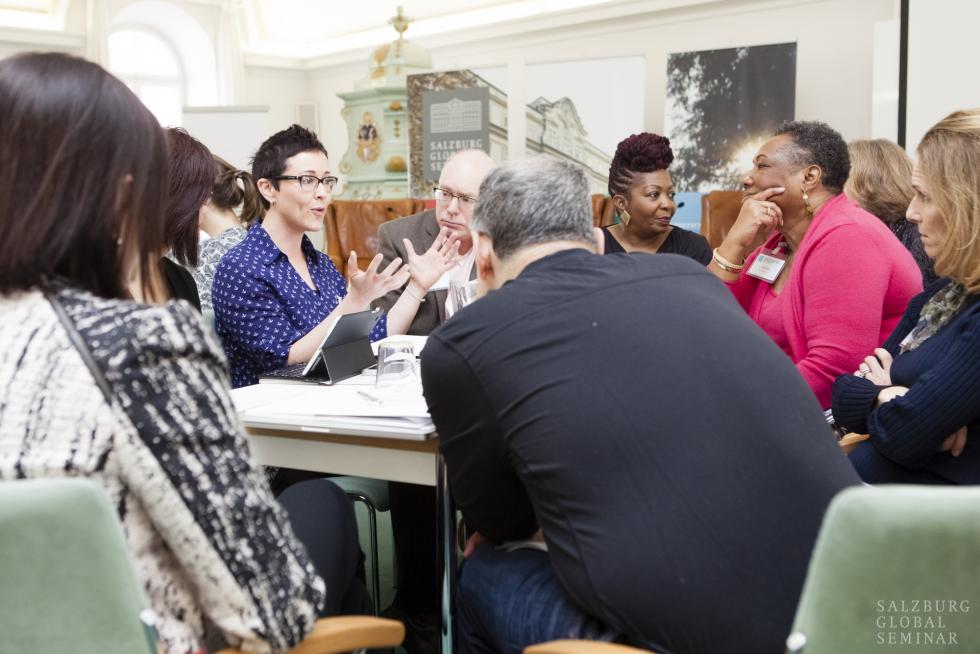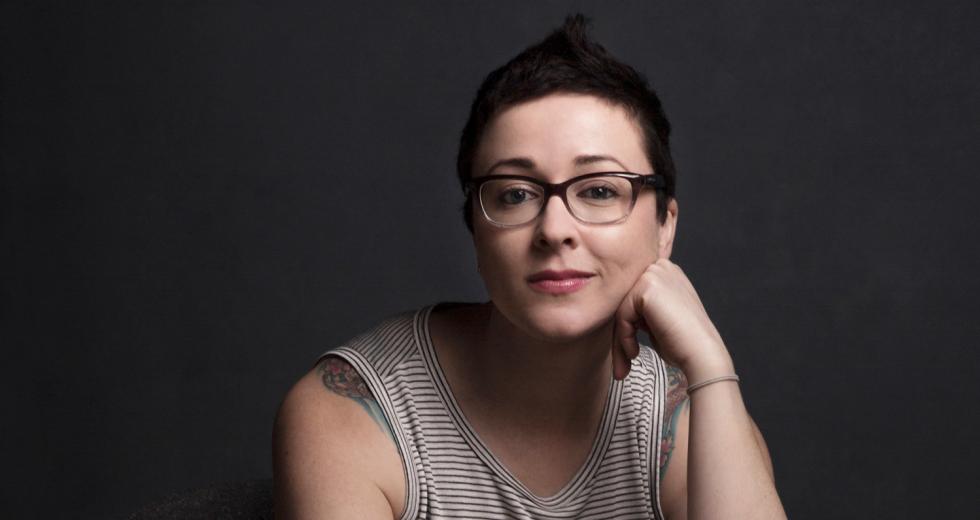On the morning of Monday, July 21, 2008, Liz Salmi started her first day of work at an architecture firm in Roseville. She had just turned 29 years old, and the new position meant a pay bump and a role handling graphic design and branding. Everything went well. She liked the vibe and creativity of the office, and one of the partners even walked around the office playing a Native American flute. “It just seemed like my dream of where a creative person could go,” Salmi says.
Tired eyes? You can listen to the audio version of this article here:
“I could feel this vibration inside me that was very strange, which I’d never felt before. A protective instinct told me to lay on the ground, otherwise I’d fall on the ground.”Liz Salmi, brain cancer survivor
Tuesday, Wednesday and Thursday were good too. On Friday, Salmi went out to lunch with her boyfriend, Brett. At around 1:30 p.m., she was meeting with two colleagues when, suddenly, she felt dizzy.
“I couldn’t understand what they were saying, and I felt so dizzy I just sat down and stopped talking to them,” she says, recalling the experience. “I could feel this vibration inside me that was very strange, which I’d never felt before. A protective instinct told me to lay on the ground, otherwise I’d fall on the ground.”
Salmi rolled onto her side. Her body started shaking uncontrollably and she went unconscious. A grand mal seizure, which manifests with violent muscle contractions, had occurred. Her boss called 9-1-1. Salmi awoke in the emergency room and a scan showed a mass in her brain.
The doctor put her on anti-seizure medications and the following weeks were a blur. Salmi couldn’t concentrate. Bills stacked up. Meanwhile, the architecture firm hired a temporary worker to fill her position. Brett moved into her apartment to become a caregiver. Family and friends fundraised to pay for her COBRA health insurance — more than $500 a month — until the coverage from her new job kicked in. The drugs weren’t working and the seizures kept happening. She felt scared and overwhelmed because there was just so much she didn’t understand.
Salmi was alone when she got the call that the mass in her brain had grown. “I remember thinking, this is like that big thing that’s going to change your life forever,” she says.
Decisions seemed impossible to make — and she had some big ones to consider. Who would take care of her after a surgery? Should she quit her job? She also had to answer questions on an advance directive, like would she want CPR if her heart stopped beating during a surgery? Would she be willing to be placed on life support?
Doctors removed the tumor in a nine-hour surgery. Her diagnosis: gemistocytic astrocytoma grade II, which is a slow-growing, but malignant form of brain cancer.
Liz Salmi is a brain cancer survivor living in Sacramento. (photo
by Kyle Monk)

Since that Friday afternoon nearly nine years ago, Salmi, now 37 years old, has gone from carefree graphic designer to an advocate for the patient’s voice. Her latest quest is to get local health systems onboard with OpenNotes, a nationwide movement to enable patients to see their doctors’ notes. All patients have a legal right to access their medical records, but accessing notes — on an ongoing basis after each appointment — helps them make sense of medical jargon, register details of conversations with the doctor and track changes in their health care. It makes them better informed and more likely to take an active role in their health care, instead of leaving everything up to the doctor.
“Having access to my notes would have added a different dimension to what I knew about my diagnosis,” Salmi says. But for all these years, she has had an incomplete picture of her health. “We live in a time where people can Google anything to find answers. If we had access to our notes, we could work more collaboratively with our doctors and be smarter about what we look for in those searches and the decisions we make.”
In the Sacramento region, at least one major medical provider is already on the same page with the benefits of OpenNotes. Across the country, an estimated 13 million patients can now access their notes. This open-source movement, proponents say, represents a shift away from a paternalistic model of medical care and toward a model of fully-engaged and informed patients. And that, they argue, is better for everyone.
THE OPEN-SOURCE PATIENT
Raised by a single mother, Salmi moved north from Southern California as a child and attended Elk Grove High School. From the age of 18 to 21, she split her time taking classes at Sacramento City College and touring the U.S. with her punk rock band, Luckie Strike — they performed nearly 400 shows, recorded three albums and filmed a music video before calling it quits.
After three years as a marketing specialist for the City of Roseville, Salmi had been overjoyed to join the architecture firm. But ultimately she lost that job to the cancer — never returning after that first week ended with the seizure. Her surgery took place in September 2008; by January 2009, the entire tumor had grown back. Another surgery was scheduled immediately. This second operation went deeper into the brain, and this time she would need chemotherapy.
“I was going to have to become a full-time cancer patient,” Salmi says. She quit her job and let herself have a big cry. “I remember saying to myself, OK, my job now is not in a professional space. My job now is being a cancer patient and … I will be the best cancer patient that I possibly can be. I didn’t say I’m going to beat this, because there’s no cure for it. But I’m going to be the most awesome, and do brain cancer so rad that I’m going to be the best person with brain cancer ever.”
But how exactly would she do that?
(Photo courtesy Salzburg Global Seminar/Ela Grieshaber)

Salmi decided first to express herself, using skills fine-tuned in her career — she would write, make videos and memes, design cool graphics and clearly communicate what she was going through to the outside world. At the time, not many online sources existed for patients with cancer to turn to in trying to understand their diagnosis and their new normal. So Salmi launched a blog called “The Liz Army” and wrote about her experience with brain cancer to translate the complicated, scientific language of doctor-speak into layman’s terms. In 2011, she ramped up on the blog and within that first year, she had over 40,000 page views.
Soon Salmi was being invited to speak on health panels and presented a TEDx talk in Sacramento in 2013. She volunteers as a community organizer for Health 2.0 Sacramento, which is a chapter of an international movement to develop health technology. She has also connected with UC Davis researchers working on the Quantified Self, which uses technology to track personal data for scientific research.
“I’m not the researcher, and I didn’t go to school to be this kind of citizen scientist,” she says. “But I’ve got this helpful data and I know that other people living with this condition, like myself, would be happy sharing this information if it led to positive outcomes for someone somewhere.”
In February 2015, she penned a blog called “I am the open source patient,” asking others to consider sharing their personal data for the greater good. The blog reflected an overriding philosophy in her life following her brain cancer diagnosis: Information is power. Salmi also launched the #BTSM (brain tumor social media) hashtag. “It doesn’t sound like a big deal — it’s just a hashtag,” she says. “But hashtags are how movements are started.”
Adam Hayden, who lives in Indianapolis, met Salmi through the #BTSM community. Hayden was diagnosed with glioblastoma in May 2016. Like Salmi, Hayden is a blogger and says he has been inspired by her example, especially when it comes to patient-centered health care: “Liz demonstrates how it is possible to get in the driver’s seat of one’s own health care and not sit passively as a passenger to the traditional doctor-led health experience.”
STRENGTHENING THE QUALITY OF CARE
In 2010, three medical institutions conducted a year-long experiment in which 105 primary care physicians shared their notes with roughly 20,000 patients in Seattle, Boston and rural Pennsylvania. The subsequent study published in the Annals of Internal Medicine found that patients with access to their notes reported feeling more in control of their health.
They had a better understanding of their conditions, and were more likely to take their medications as prescribed and follow doctor’s recommendations. All of the participants supported the idea of seeing their medical notes, and no doctors elected to stop sharing notes once the study ended, according to the report. OpenNotes was officially born, funded by several public health foundations, and Salmi recently signed on as paid consultant to advocate for the cause.
The OpenNotes team learned of Salmi through a short documentary called “The Open Patient: Healing Through Sharing,” which features her story. (The film was produced by Red Hat, a company that sells open-source software products.) “How insanely helpful would that be?” Salmi recalls thinking, when she first learned of OpenNotes.
Women provide the majority of care for their families, and this sure would make their lives easier, she says. For people with chronic conditions or serious diagnoses, accessing notes could be a game-changer in keeping them informed and decreasing some of the anxiety that accompanies endless doctor’s appointments.
Sutter Medical Group in the Sacramento region started sharing doctor’s notes in February 2016, after piloting the system for two years with 40 clinicians, according to Chief Medical Officer Dr. Michael Conroy. Sutter includes about 850 clinicians in a six-county region. “We look at it as a quality and patient-engagement issue,” Conroy says.
During the pilot program, Sutter found three main responses from patients: First, they gained a deeper appreciation for the level of thought that went into their care. Second, if a doctor occasionally misdescribed something — like Ms. Jones had soreness on the left wrist, when actually it was the right wrist — this could easily be corrected. Third, the patient was able to write back to update critical parts of the medical record, like if she learned her grandmother had breast cancer. Conroy says the use of notes also increases the likelihood that a patient will complete treatment or follow up on a referral to see a specialist.
Initially, Conroy says, physicians worried about a flood of incoming messages from patients. “That didn’t happen at all,” he says, adding that sharing the notes is “literally no extra work.” Once a doctor enters a note into the hospital’s electronic health record software, and then closes the page, it is automatically available to the patient. Sutter Medical Group produces over 150,000 notes a month, and Conroy says more than 20 percent are read by patients.
Liz Salmi attended the Salzburg Global Seminar in March to talk
about OpenNotes. (Photo courtesy Salzburg Global Seminar/Ela
Grieshaber)

“We know that patients remember only about 20 percent of what is discussed in a patient visit,” Conroy says. “That’s independent of age, disability or educational level. [Open notes] allows them to study their notes at home in their free time, and family members can read them, and it’s right there in black and white.”
Currently in the Sacramento region, only Sutter Medical Group and the VA Northern California Health Care System make notes available to patients immediately following a visit.
“HIPAA provides all patients with the legal right to obtain their records, but it doesn’t make it easy,” says OpenNotes Executive Director Dr. Catherine DesRoches. “And while the electronic health record makes ready access possible, not every practice utilizes an EHR and not all EHR systems currently have the technical capacity to share notes with patients, though most are working toward adding that functionality.”
For most health systems, making the switch literally means just the press of a button. The two biggest vendors of electronic health records — Epic and Cerner — provide the note-sharing function, according to DesRoches, and because notes can be shared using existing records and the patient portal (or they can be printed and mailed), expenses are minimal.
A total of 76 health systems in 37 states, plus all U.S. Department of Veterans Affairs locations across the country, have adopted OpenNotes. Researchers are now beginning to analyze the economics of improved patient engagement. Theoretically, giving patients the tools to take better care of themselves and ensure the accuracy of their records will lead to overall cost savings in the long run.
KNOWLEDGE IS POWER
Stormy weather on a February evening hasn’t stopped about 50 people from coming out to the Uptown Studios marketing firm in Sacramento for PechaKucha, an international speaking event in which presenters tell their stories via 20 slides shown for 20 seconds each. Tonight’s theme is breaking the glass ceiling, and Salmi is here to present. The ceiling she’s trying to break is health care.
“Oh my god, this lady has so much energy, she’s working for social change, she’s so smart and she’s incredible,” Tina Reynolds, founder of Uptown Studios, tells the crowd.
Salmi, wearing a T-shirt that reads “Stupid Cancer Get Busy Living,” begins her talk by declaring that she has brain cancer and noting how doctors told her the diagnosis had a five-year survival rate of 30 percent. “Spoiler alert: I’m still alive.” The crowd chuckles, and her dimples deepen.
“There’s no right way to respond to a brain cancer diagnosis,” she tells the audience. “I responded with curiosity.”
Curiosity also led her to recently re-engage with her absentee father after he too was diagnosed with brain cancer. The scientific community is still grappling with how much of this disease relates to genetics; it’s hard to find subjects to study because both family members need to be alive. Salmi’s father died a few months ago, and while she says she hasn’t shed a tear, he made her more aware of her mortality and forced her to ponder handling her own end stages when they come.
In February, Salmi finally got access to her doctor notes through Kaiser, as she prepared to switch insurance providers. The PDF document was more than 4,800 pages. “I was skimming through it and when I got to around page 900, I realized the story was from my health system’s perspective on what’s happening to me, meanwhile I’ve been telling my story on my blog … It’s like a movie that starts with one person and jumps to another person and you’re thinking, ‘When are these story lines going to merge at the end?’” A merging of the two, she believes, is when the one true perspective will come through.
Salmi is healthy besides living with brain cancer, so in March she flew to Austria to participate as a fellow in the Salzburg Global Seminar, an annual conference to tackle topics of global importance. She was joined by her now-husband, Brett. She quit her job at a nonprofit health organization to pursue the opportunity, and she’s excited to see what will follow. “I’m open,” she says, “to everything.”




Comments
This suggests Liz is curious. It is clear that even a thesaurus is deficient when it comes to her because it lacks a word that describes her more accurately then curious as curious does not come close to how much time and effort she puts into figuring things out, learning about things she has not figured out, and helping others who lack the skills or time to fulfill their own curiosity about their medical issues. In other words, there ain't no word adequate to describe this young women.
Bob--They are going to think I paid you for this comment. (Check is on the way.) ;)
I am proud to say I knew Liz when she was a bubbly new person working for the City of Roseville. I have followed her journey and can only say she is one in a zillion She rocks! And she is such an advocate for patients. I believe that this is truly her destiny in the most fantastic meaning of that word!
Thanks, Jan! It's great knowing people have had my back all these years. :)
I am proud to say I knew Liz when she was a bubbly new person working for the City of Roseville. I have followed her journey and can only say she is one in a zillion She rocks! And she is such an advocate for patients. I believe that this is truly her destiny in the most fantastic meaning of that word!
This is a fantastic read, and what we, at Spry Health, are trying to accomplish. Thank you for sharing, and we will be sharing this incredible woman's journey and her journey. We were all deeply inspired. Thank you.
I met Liz when we were both attending a Ted-X conference in Sacramento and have kept in touch since. Without even going in to the groundbreaking efforts she has made, she is special woman who we are fortunate to have in our community. I am confident in saying, even if she wasn't stricken with a brain tumor, her curiosity would lead her to helping others in different ways. I appreciate Comstock doing a feature on one of our local gems.
Interesting read, thank you for sharing your story Liz.